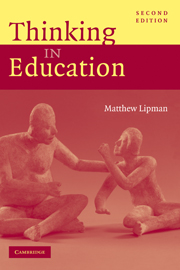Book contents
- Frontmatter
- Contents
- Preface
- Introduction to the Second Edition
- PART ONE EDUCATION FOR THINKING
- 1 The Reflective Model of Educational Practice
- 2 Approaches in Teaching for Thinking
- 3 Obstacles and Misconceptions in Teaching for Thinking
- PART TWO COMMUNITIES OF INQUIRY
- PART THREE ORCHESTRATING THE COMPONENTS
- PART FOUR EDUCATION FOR THE IMPROVEMENT OF THINKING
- Bibliography
- Index
3 - Obstacles and Misconceptions in Teaching for Thinking
Published online by Cambridge University Press: 05 June 2012
- Frontmatter
- Contents
- Preface
- Introduction to the Second Edition
- PART ONE EDUCATION FOR THINKING
- 1 The Reflective Model of Educational Practice
- 2 Approaches in Teaching for Thinking
- 3 Obstacles and Misconceptions in Teaching for Thinking
- PART TWO COMMUNITIES OF INQUIRY
- PART THREE ORCHESTRATING THE COMPONENTS
- PART FOUR EDUCATION FOR THE IMPROVEMENT OF THINKING
- Bibliography
- Index
Summary
CONCEPTUAL OBSTACLES TO THE STRENGTHENING OF THINKING
I take up first the conceptual obstacles to the improvement of thinking in schools and colleges. Later I will deal with some of the more practical aspects of the problem.
Disagreements over the nature of thinking
We are not sure what thinking is, just as we are not sure what life is, or experience, or being human. When problems like the abortion issue come to the surface, the general public discovers that matters like these have to be confronted and deliberated upon by everyone. But we must first make provision in the schools for installing thinking as a fundamental aspect of education; and to do this, we need clues as to just what arguments we are dealing with. Following are some of the disagreements that emerge when we begin to consider what we must do to focus on education for thinking.
1. The conception of thinking primarily entails problem solving
versus
The conception of thinking primarily entails problem seeking
Comment. By and large, this difference exemplifies the radical difference between education in the sciences and education in the humanities. Science textbooks tend to treat scientific knowledge as settled. Students learn standard methods of problem solving and then are assigned problems that vary somewhat from the paradigm to see if they can extrapolate from the established approach. In the humanities, in contrast, the subject matter is treated as intrinsically problematic, and students are encouraged to look for new problems of interpretation or conceptualization.
Information
- Type
- Chapter
- Information
- Thinking in Education , pp. 64 - 80Publisher: Cambridge University PressPrint publication year: 2003
Accessibility standard: Unknown
Why this information is here
This section outlines the accessibility features of this content - including support for screen readers, full keyboard navigation and high-contrast display options. This may not be relevant for you.Accessibility Information
- 1
- Cited by
